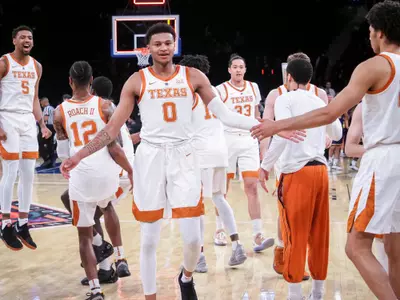The University of Texas at Austin Athletics

Men's Basketball feature: Confidence gained
10.30.2019 | Men's Basketball
The trio of Royce Hamm Jr., Kamaka Hepa and Gerald Liddell used last year’s run to the NIT Championship as a building block for their continued individual development.
AUSTIN, Texas -- When head coach Shaka Smart called each member of his team on Selection Sunday last year to let them know the Longhorns would not be playing in the NCAA Tournament, two reactions happened. The first, understandably, was disappointment.
By the time the team gathered later that night to find out its first-round opponent in the NIT, a different mindset took over the room.
"As a group, we looked around at each other and collectively said, 'If we're in this tournament, let's go out and win it,'" junior forward Royce Hamm Jr. remembers.
The team did just that. Five victories later, the Longhorns cut down the nets at historic Madison Square Garden and celebrated that night in the New York Knicks locker room. Upon returning to Austin, they flipped the page again and began working on improving for the upcoming 2019-20 season.
Three individuals who were not a consistent part of the playing rotation during the regular season – Hamm along with current sophomore forwards Kamaka Hepa and Gerald Liddell – each seized the opportunity to earn increased time on the court during UT's five-game run to the NIT title. All three showed flashes of success and gained confidence that has continued to build entering this year.
Liddell consistently put in extra work after practice and on game days last year when he knew he would not be playing a lot. Despite limited playing time in games, he continued to do what the coaching staff asked.
"Gerald deserves a lot of credit for putting in that behind-the-scenes time and work," Smart said. "His body was more prepared for the physicality and speed required at this level. Mentally, he gained confidence. And his skill level got better on the court."
"Coach gave me a chance in the NIT, and I tried my best to do the right things when I got on the floor," Liddell said. "Coming from not playing at all to getting on the court and making an impact, it upped my belief. It gave me confidence that I could affect this team and be a key piece."
"On defense, I need to be a player who can disrupt the game, whether it be getting deflections or steals and getting into the passing lanes," Liddell continued. "On offense, I'm trying to improve my shot. And in ball screen action, the coaches have put more trust in me."
"Last year was a really good lesson for Gerald in terms of gaining an understanding of how to become an all-around college basketball player," Smart said. "He's definitely our most improved player from last season. Gerald is more assertive and knows he belongs."
For Hamm, the key was embracing a role of playing with a 'junkyard dog' mentality and not playing with avoidance.
"When Jaxson (Hayes) got injured, Royce's teammates let him know what they needed from him," Smart recalled. "Royce stepped forward and played very well for us down the stretch."
"I needed to be the 'grit' guy for my team," Hamm Jr. explained. "My primary role at the start of the NIT was being a lockdown defender and rebounding the ball. When I did that, other things began to fall in place for me."
"Playing well for my team during the NIT gave me so much confidence heading into the summer," Hamm stated. "My role is to rebound the basketball and I'm truly embracing that. I've learned I can be a high-level player and an asset to this team."
Kamaka Hepa experienced the defining moment of his freshman season a few weeks prior to the postseason. After not playing in the previous three contests, he made his first collegiate start in UT's game at Baylor on February 27, when Dylan Osetkowski missed the contest due to illness. Hepa responded with career highs in scoring (11 points), three-point field goals made (3-3) and minutes (39).
"I saw playing in the NIT as an opportunity to prove to the coaches that I was still committed and bought into winning," Hepa reflected. "That experience definitely built confidence in myself personally and my ability to play at this level, and it motivated me to work harder this summer."
"Kamaka came off the postseason and put in as much time as anyone on our team," Smart said. "He brought his academic schedule in very early during summer school and asked, 'what do I need to do extra?' We mapped out his week and talked about different areas of the game and things he could do on his own. To his credit, he went and did it."
"Kamaka is very intelligent, on and off the court," Smart added. "He certainly is speaking up more in practice. That will be even more effective as he asserts himself as a player and continues to gain confidence on the floor."
"My shot discipline is getting a lot better," Hepa said. "Working individually with both Coach Berry and Coach Lucas, we've been fine-tuning the mechanics of my shot, and that is translating well into live play. I'm also embracing more of a leadership role this year. I feel I'm a pretty good vocal leader, and that's one area of my game that I'm continuing to work on and build."





